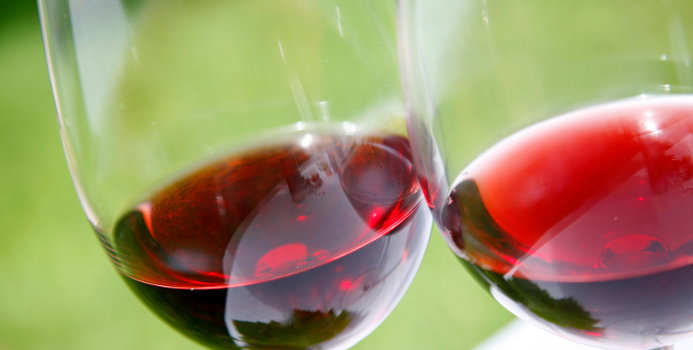Red wine is a very popular alcoholic beverage around the world. Some red wines are recommended for different types of meals for flavor reasons. Red wine is often claimed to be a "health food," but reality is that most alcoholic beverages provide little if any nutritive value. Furthermore, alcohol can interfere with nutrient absorption and heavy drinkers may not get all the minerals and vitamins they consume. The most nutritious benefit of wine is are the high concentrations of phytonutrients and antioxidants. These protect the body, fight free radicals and even repair damage already done.
Potential benefits of drinking red wine (besides enjoyment!) include lowering the risk of heart disease for adults. Furthermore, for those people who are suffering from small appetites, one glass of wine before a meal can stimulate appetite and make the meal more appetizing, which may be an incentive for older adults.
Nutritional Value of Red Wine
1-5oz glass of red wine
Calories: 125
Fat: 0g
Carbohydrates: 4g / 1% DV
Fiber: 0g
Protein: 0g
Manganese: 0.2mg / 10% DV
Potassium: 187mg / 5% DV
Health Benefits of Red Wine
Manganese
Red wine is a good source of manganese. Manganese is part of many enzymes and plays a key role in bone formation. Furthermore, it helps in the metabolism of energy from the food you eat. This energy, in turn, fuels your body and provides energy for the trillions of cells in your body.
Potassium
Some potassium is also found in red wine. Potassium is a mineral important for regulating the fluid and mineral balance both inside your cells and in the extracellular fluid outside your cells. Potassium keeps blood pressure normalized by maintaining the balance of fluid inside and outside of your cells by reduce sodium's effects. Additionally, it is especially important for athletes, people heavily exercising or those living in hot climates to consume enough of this electrolyte so that your muscles can continue contracting normally.
Wine is linked to heart health by increasing HDL blood cholesterol and preventing LDL cholesterol from forming.
Red Wine and Phytonutrients
Flavanols: Wine contains flavanols which are phytonutrients linked to maintaining heart health, neutralizing free radicals that can damage cells and boosting antioxidant defenses in cells. Phytonutrients, like flavanols, are naturally produced by plants to protect them from viruses, bacteria and fungi. Similarly, in the body phytonutrients appear to reduce your risk of diseases by working as antioxidants to fight free radicals. Phytochemicals/phytonutrients are what provide the aroma, texture, flavor and color of foods.
Flavonoids: This is another phytonutrient group found in wine and includes resveratrol. These are linked to heart health, urinary tract health and antioxidant defenses. Specifically for resveratrol, these phytochemicals may increases the oxidation of LDL cholesterol and increase HDL cholesterol. Also being researched is if resveratrol boosts the natural clot-dissolving enzyme, which could help reduce your risk of heart attack or stroke.

Emily DeLacey MS, RD is a Registered Dietitian and currently working in Jamaica as a HIV/ AIDS Prevention Specialist. She attended Central Washington University for her Bachelor's Degree in Science and Dietetics and continued on after her internship to Kent State University for her Master's Degree in Science and Nutrition, with a focus on public health and advocacy. She served as a U.S. Peace Corps Volunteer in Malawi 2012-2014 working as a Community Health Advisor in a rural village, immersing in the joys of life without electricity or running water. She has been to 20+ countries and 47 of the 50 states in the US. Traveling, adventuring and experiencing new cultures has made her a passionate advocate for the equality of nutrition and wellness for all people.



